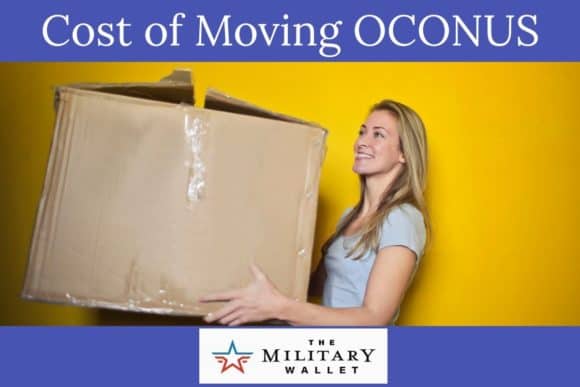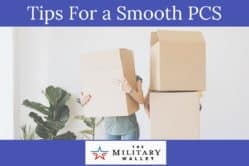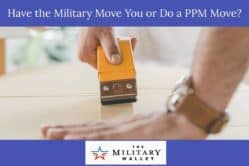Table of Contents
An OCONUS PCS assignment can be both exciting and intimidating – especially for families and servicemembers who have never moved overseas. While there are a lot of fantastic resources available at your installation to help guide you through the process, there are still a lot of questions that often are unanswered. What is it like to live on the economy? To ship pets? This FAQ sheet hopes to make the process a little smoother.
Miscellaneous Costs Add Up
There’s so much to consider with an OCONUS move, and sometimes small details can slip through the cracks. The more you plan ahead, the less likely you’ll find yourself shelling out hard-earned money for avoidable mistakes.
Consider your cell phone. If it’s not unlocked, you won’t be able to use it in most OCONUS locations. It’s easy to do stateside but might cost extra when you’re abroad, so make sure you add that to your list. You should also look into canceling your cell phone contract if you will be overseas too long. Most cell phone companies have cancellation policies for military members and their families who move out of the U.S. on orders.
Most OCONUS locations offer you access to the Armed Forces Network (AFN) TV, which gives you free access to basic network options. If you’re living on the economy and you’re serious about keeping up with American TV, you’re going to have the added cost of cable or streaming services.
There are lots of things that are going to cost more when you’re overseas – things like fresh fruit, car parts and your favorite products all cost more. It might seem weird to stock up on motor oil while you’re still in the U.S., but it’s well worth the forward-thinking. In some cases, you can expect to pay about twice what you’re used to domestically. The same goes for products that you know you and your family can’t live without. Commissary stock is limited and can run out quickly, so use the time before your move to purchase what you think you’ll need. Host nation economy shopping can be more expensive since you have to pay the local tax.
Housing Costs May be Different Than You are Used to
Just like stateside installations, OCONUS assignments might involve you and your family being assigned government quarters. In some cases, you might be mandated to live in government lodging, which means that you’re not able to explore the option of living on the economy.
Rank, housing availability and family status all factor into what choices you may have. Sometimes living on the economy can be financially lucrative if you happen to find a house that accommodates you and your family. While most locations operate under a “use it or lose it” approach to housing allowance, you may receive a flat rate for utilities. And if you don’t use the total amount you can “pocket” the difference.
It is important to keep in mind that most lodging in OCONUS locations is going to be smaller than what you might expect in the U.S. The Overseas Housing Allowance calculator can help you determine your rent cap to help narrow your choices. Depending on where you move, you may see allotments also include a “move-in” allowance in addition to your monthly rent and utility allowance.
All OCONUS locations are different. For instance, in Japan you are required to pay your first and last month’s rent and you need to budget for “key money” which is equivalent to one month’s rent. This amount is not returned to you, as it is considered a gift to your new landlord.
If your installation is at housing capacity and you’re able to live in a dwelling of your choice, it’s an excellent idea that you have a native speaker or your local legal office review any contract before you sign it.
Moving Pets OCONUS
Pets usually accompany you and your family during your move but need to have a “seat” just like passengers. On Patriot Express flights, in-cabin pets have to be within the height and weight limits. Otherwise, they’re regulated to below the plane.
If there is no room available for them on these flights you may need to fly them on a commercial airline. All airlines have specifics about the type and size of kennels required for live animals. Generally speaking, the kennel needs to be large enough for the pet to stand up in and wide enough that they can turn around.
Every host nation has pet immigration requirements, including limits on specific breeds as well as requisite immunization policies. As the owner, you’re responsible for all costs associated with moving your pet abroad, including any mandatory quarantine that the host nation might require. Prices for pet fees are subject to change, so it’s best to check for updates before checking in.
If you have an emotional support animal or service animal, it’s possible that your fees might be waived. However, each airline has its own requirements for these particular types of animals.
Ship or Store? – Privately Owned Vehicles (POV) OCONUS
As we covered in our PCS move post, the military will only pay to ship one vehicle. So if you’re a multi-vehicle family, expect to pay out of pocket to ship your POV to the next installation. To clear up confusion and to help get a better understanding of what to expect, you should contact the closest Vehicle Processing Center (VPC) that services your new installation.
OCONUS moves often have specific requirements about the condition your vehicle must be in for it to be shipped. In addition to having no open recalls on the car, truck or SUV, you also need to provide documentation that you either own it outright or that your lender is aware you’re shipping it overseas.
At the VPC, your vehicle is inspected for cleanliness and double-checked that all paperwork is in order. Once you release it to the shipper, you need to contact your car insurance provider and change your auto coverage. There is a specific type of auto insurance that is required while your vehicle is on the ship overseas. You can speak directly with your insurance carrier for more information. This insurance is an added cost but helps protect your vehicle while it’s in transit.
Auto insurance might cost more overseas than what you’re used to paying, especially if you’re living on the economy. Before you PCS, talk with your carrier to explore options that might be best for you.
If you decide to store your vehicle during your OCONUS assignment, you can do so at the government’s expense only if the vehicle can’t be shipped or will require extensive modifications. This option is common in countries like Japan where they drive on the left side of the road. Some host nations have specific requirements about window tint, while others have rules governing engine noise. Check with your local Transportation Service Provider (TSP) for more specific guidelines. The government will only cover standard vehicles, so if you have a recreation or oversized vehicle, you’ll be paying out of pocket to keep it in storage.
Purchasing a vehicle OCONUS comes with its own set of costs. In addition to paying for whatever host nation requirements are in place, you’ll also need to purchase license plates and registration tabs. Host nation regulations vary by location as do the types of taxes you’re required to pay when buying a POV. If you decide to explore this option, consider purchasing a U.S.-spec vehicle so it can (eventually) be shipped back to the states once your assignment is over.
As any military family knows, a PCS assignment comes with unexpected surprises. Nothing can be predicted. And an OCONUS can bring even more surprises. Moving OCONUS can be a thrilling time for you and your family, as long as you think ahead and prepare well.




About the comments on this site:
These responses are not provided or commissioned by the bank advertiser. Responses have not been reviewed, approved or otherwise endorsed by the bank advertiser. It is not the bank advertiser’s responsibility to ensure all posts and/or questions are answered.